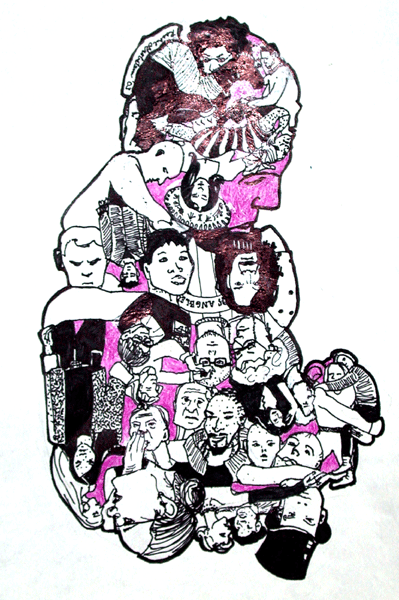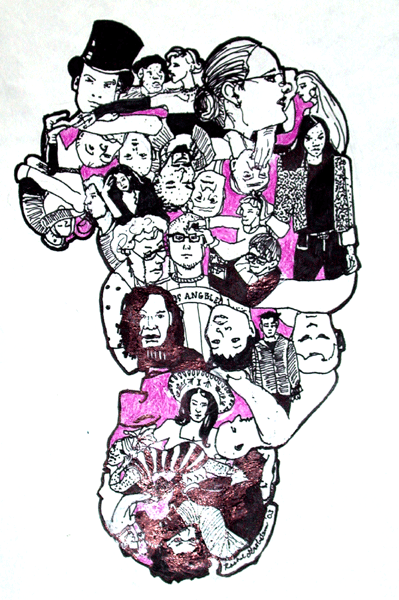Made available on Serendip
In association with Making Sense of Diversity: An Exploration, a world wide conversation

| Campus Diversity from the Perspectives of Some Members of the Staff
Participants
Summary
Prepared by Anne Dalke
Additions, revisions, extensions are encouraged in the On-Line Forum
| 
|
Ellie, Paul, Arthur and Debbie told us what it's like coming here every day, not as a student or a member of the faculty. A staff member at Bryn Mawr belongs in one of three levels: AP (administrative/professional), CT (clerical/technical), or SC (service/craft). The staff is separated among themselves by those categories, and moving among or transcending those levels can cause discomfort; each group makes judgments of the other, and there are serious divides between them. Fulfilling a clerical role for a meeting of administrators, for instance, may mean that one is not asked to introduce oneself and feels frustrated at not speaking up. This can lead to a re-evaluation of one's role and its relationship to the work that others do here.
The staff at Bryn Mawr try to do their best; sometimes they learn that they have to change to be successful in a college environment. They take it for granted that everyone has talents, that everyone brings to campus a different set of skills and attributes, and that theirs include sharing with students advice about the world outside. There have been many changes at the college over the past twenty years, and lots of improvement in a number of areas, including in the relations between students and employees. It's great to have a conversation and know that you have helped a student. But sometimes the students are not ready to hear what staff members can tell them. The students are not as diverse as they think they are (or are they more diverse than they realize? Many things are taken for granted on campus which do not reflect the background experiences of all students.)
A woman's college like Bryn Mawr may even be a contradiction in terms: there is "no true diversity" in single-sex gathering, where certain traditions and trends emerge around a set of core values. There is also a generation gap between students and many members of the staff: the older generation knew that they had to work their way up the organizational chart, but that chart has since "flattened." There have been many technological changes, and students now think they can "do it their own way." They have a lot more power to say "now" when they want something, and "no" when they do not.
Students often don't realize, until they leave, how much is offered here, how many services on campus mimic--or even exceed--what is available outside.
The three "bodies" of people on campus--staff, students and faculty--have different colors. Many of those who work in staff and facilities are people of color; very few of the faculty are; students who are like one another seem to stick together. The college is trying to bridge these gaps. Some staff members see that their job is to support students: "I work for them; they are the consumers of the product we have to offer--education, and I value our interactions." "Food is our vehicle to get to the students"; a lot of educating of students goes on in the dining halls. Other staff members think that students don't realize that they can learn from the people who (for instance) serve their food or clean their rooms; they take for granted the services that are provided for them. Other members of the faculty and staff think that they are "not here for the students; the students are here for me"--or rather, that the relation is a reciprocal interaction in which everyone can learn from everyone else.
It is hard to realize a community that values many different types, if one set of people is identified as being here to serve another. Everyone should try to make the effort to learn from others, as well as be willing to challenge them and say, "you can not go in that direction." In part, whether one sees oneself as fulfilling a service role or being in a reciprocal relation is a matter of choice. But there are also structures operating in this community which make it harder to feel reciprocally related to others. Some classroom practices, for instance, make it difficult for students to see themselves as anything other than consumers.
There is surely a range among students in how much access they feel they have to members of the staff; some acknowledge receiving very powerful advice from people here who are not faculty members. Others feel uncomfortable being served; still others feel equally uncomfortable when they are assigned a job (in Dining Services, for instance) where they are providing service to others. There is a danger of disrespecting the service providers, and taking them for granted.
A certain type of knowledge is privileged here; many students feel that they cannot learn from, or respect, someone who has not mastered "book knowledge." The problematics of that hierarchy of knowledge creates all the other hierarchies on campus, among faculty, between staff members, and among student-consumers. Such a hierarchy also divides people against themselves, because they are invited to show only one part of their identity.
Many students have a very limited world view; everyone they know is college-educated. Getting to know members of the staff can help such students--and others who feel stress, or place stress on themselves--to put things into perspective. Staff members can help to prepare students for the outside world, to learn how to be productive members of society, to interact with people from all walks of life. Staff members help educate students to be respectful of procedures, to plan ahead, to allow for the fact that we have lives and interests outside our work at the college. Even our learning to say "no" can be part of the students' education into ways that we can all exist in meaningful relationships with one another, not as subservient or reactionary. We all struggle with the amount of time we spend at work. Do the students want us to be here, or do we need to be here? Where does responsibility lie? With staff members who do not meet students' needs? With students who do not plan ahead, in order to accomodate the needs of staff?
Do staff members feel that students acknowledge what they provide, or do they feel taken advantage of? The relationships between staff and students would seem more reciprocal if appreciation were expressed for services rendered. We all have the ability, and the responsibility, to engage in reciprocal relationships: this involves becoming engaged with others, as well as respecting their boundaries.
The discussion of these questions is invited to continue in the on-line forum on "Making Sense of Diversity." The conversation will resume in person at noon on Friday, February Feb. 25 Anne Dalke (Feminist and Gender Studies, English), Katy McMahon (05), Michelle Mueller (05), Jessie Payson (06) and Gilda Rodriguez (07) will talk about "What's In a Name?: Re-defining Feminism @ Bryn Mawr in 2005."
| Return to Schedule for Friday Noon Conversations

| Bryn Mawr Conversations
| Archived
Forum
| Archive of Bryn Mawr Conversation
| General Conversation
| Serendip Home |
These pages are sponsored by the Bryn Mawr College Office
of Intercultural Affairs, the Center for Science and Society and the Serendip
website. Send us additional comments or suggestions at Serendip
© by Serendip 1994-
- Last Modified:
Wednesday, 21-June-2005 15:18:00 EST

